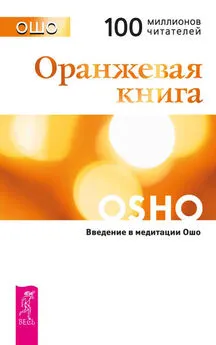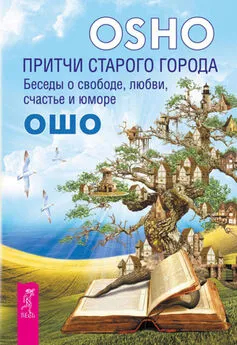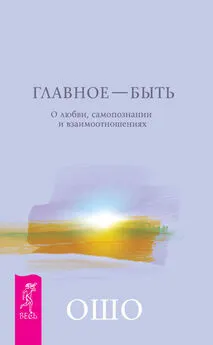Бхагаван Раджниш (Ошо) - Послания любви. 365 писем Ошо
- Название:Послания любви. 365 писем Ошо
- Автор:
- Жанр:
- Издательство:Array Литагент «Весь»
- Год:2012
- Город:СПб
- ISBN:978-5-9573-2446-1
- Рейтинг:
- Избранное:Добавить в избранное
-
Отзывы:
-
Ваша оценка:
Бхагаван Раджниш (Ошо) - Послания любви. 365 писем Ошо краткое содержание
Речь Ошо необыкновенно поэтична. Чтобы читатель прочувствовал ритм и неповторимый стиль великого мастера, в книге, помимо перевода, приведен оригинальный английский текст. Исполненные тепла и любви, где каждая фраза наполнена глубоким смыслом, эти письма будут вашим другом и помощником в познании себя.
«Суть не в том, что вы слушаете, но как вы слушаете – потому что послание повсюду, повсюду, повсюду» (ОШО).
Ранее книга выходила под названием «Чашка чая. 365 писем Ошо».
Послания любви. 365 писем Ошо - читать онлайн бесплатно ознакомительный отрывок
Интервал:
Закладка:
because it does not know yet that it has been cut off.
But his companion said:
Yes, it may be ignorant of the damage it has suffered,
but it will know in due time.
Hearing this the Sufi laughed and said:
Meanwhile you cannot reason with it.
This reverence is the state of man.
This ignorance is the state of man –
and meanwhile you cannot reason with him!
Or can you?
But this is irrelevant.
If you can reason with yourself that is more than enough!
302. Love.
In life everything is whole, and organically whole.
You cannot divide it
or take it in parts.
Love is like that
and meditation is also like that.
Even death is like that.
That is why I say:
Death is not dead but organically one with life.
You cannot die partially!
– either you die or you do not die.
Nor can you die gradually.
Please remember this always
when you are in meditation or in prayer or in worship.
A very valuable dachshund
owned by a wealthy woman was run over.
The policeman sent a man
to tell the woman of her misfortune.
But break the news gently, he said.
She thinks a lot of this dog.
The man rapped on the mansion door
and when the woman appeared, he said: Sorry, lady,
but part of your dog has been run over.
303. Love.
Artificial and outward discipline have no use –
the inner and natural discipline is enough.
But what is the inner discipline?
In one word: acceptance –
total acceptance.
And acceptance can be only total
because partial acceptance
is just a contradiction in terms.
If you live – live!
If you die – die!
If you suffer – suffer!
And then there is no problem
and no anxiety
and no anguish –
and what freedom !
A Zen master was once asked:
It is terribly hot, how shall we escape it?
Why not go, answered the master,
to the place where it is neither –
neither hot nor cold?
Where is that place?
And then the master laughed and said:
In summer we sweat and in winter we shiver .
304. Love.
How can a man learn to know himself? inquires Goethe,
and then answers:
Never by reflection but only by action.
John Burroughs doubts this.
He says:
Is not this a half-truth? –
because one can only learn his powers of action by action
and his powers of thought by thinking.
But I say that
man is always more than all his actions and
all his thoughts,
and unless that more is known no one knows himself.
That more can be known neither
by action nor by reflection
because they both belong to the periphery
and that more is eternally the center.
It can only be known through witnessing action
and thought both:
not by them but by witnessing them.
And witnessing is meditation.
305. Love.
There is no answer to man’s ultimate questions
because the questions are absurd,
and moreover there is no one to answer them.
Existence is silent and has always been so,
so do not ask
but be silent and live it and know it ,
because there is no knowing except living.
The search for answers is meaningless.
A patient in a mental hospital
placed his ear to the wall of his room, listening intently.
Quiet! he whispered to an orderly and pointed
to the wall.
The attendant pressed his ear against the wall, listened, and then
said: I don’t hear anything.
No, replied the patient.
It’s awful, it’s always been this way!
306. Love.
The mind lives in a logical somnambulism,
and it feeds on arguments and words.
You cannot come out of it gradually
or logically or rationally.
Rather, take the jump ,
illogical and irrational —
and the jump can be nothing else than that.
It cannot be calculated
or conceptualized or predetermined
because it is going into the unknown
and the unchartered
and the unpredictable,
and ultimately not only into the unknown
but into the unknowable also.
307. Love.
Meditation cannot be taught directly
because it is not a mechanical technique,
but a living art.
Dogo had a disciple called Soshin.
Soshin waited long with his master
to be taught the art of meditation.
He expected lessons the way a schoolboy
is taught at school,
but there no special lessons were forthcoming,
and this bewildered and disappointed the disciple.
One day he said to the master:
It is a long time since I came here
but not a word has been given to me
regarding the essence of meditation.
Dogo laughed at this heartily and said:
What are you saying, my boy?
Since your arrival I have continually
been giving you lessons on the matter!
At this the poor disciple was even more bewildered
and for some time he could not think what to say.
Then one day he gathered courage and asked again:
What kind of lesson could it have been, sir?
Dogo said:
When you bring me a cup of tea in the morning, I take it;
when you serve me a meal, I accept it
and when you bow to me I return it with a nod.
How else do you expect to be taught in meditation?
Soshin hung his head
and began to think about the
puzzling words of the master,
but at this the master said again:
If you want to see, see, right at once ,
because when you begin to think
you miss the point altogether.
308. Love.
Meditate, pray and wait.
Do not will anything,
for in you there is strength
greater than any strength of your own.
But it works only when your will is at rest .
309. Love.
Be free at the center;
let the center relax and die:
be only a circumference –
and this is the only renunciation I know.
No man is free until he is free at the center.
When he lets go then he is really free –
and then life is not anguish
and then life is not agony
because no hell can exist without the self, the center.
310. Love.
Do you hear me?
Do you see me?
I stand at the door and knock,
and I knock because of a promise made
in another life and another age.
311. Love.
Be in the crowd as if you are alone
and vice versa.
Receive a guest with the same attitude
you have when alone,
and when alone
maintain the same attitude you have in receiving guests.
In this way the drop drops into the ocean .
On retiring, sleep as if you have entered your last sleep,
and upon awakening be reborn again.
In this way the ocean drops into the drop .
312. Love.
Emptiness is not really emptiness:
rather, it is the all.
It is not negative:
rather, it is positivity itself.
It is out of it that everything is born
and to it everything returns.
It is the source and ground of all existence.
So whenever I say emptiness
I never mean just emptiness!
To me emptiness is not the absence of anything
but the presence of emptiness itself .
And now you can understand it
because you yourself are in it,
and it is in you.
Once a student asked Joshu: Sir, you teach that
we must empty our minds,
but I have nothing in my mind;
now what shall I do?
The old master laughed and said:
Throw it out!
But I have nothing. How can I throw it out?
If you can’t throw it out, carry it out!
Drive it out!
Empty it out!
But don’t stand there in front of me with nothing
in your mind!
313. Love.
Come here whenever it is possible.
You will always be welcomed.
And stay with me a little longer,
and let me help.
It will be difficult for you
because you will have to let go of yourself completely.
But it is not impossible –
and for you especially
because I have seen in you the great potential
that is awaiting its opportunity.
With you much that is impossible is possible.
There is a seed which is longing to explode.
Its very longing is the source of your search,
its longing is the tension that you are today
and its longing will be the freedom
that you will be tomorrow.
The essence is there and
the existence will follow if you so wish.
Please follow its call to the conclusion .
Go on doing meditation.
Do not seek results,
they will come by themselves when the time is ripe.
And the time is ripe
but you still are not.
Let meditation ripen you.
314. Love.
Life is non-fragmentary,
but mind makes it appear fragmentary;
and this fragmentation creates all the problems.
Beware of fragments
and always look beyond them
and below them
and through them –
then you will be able to see the ocean
in spite of all the waves.
The waves are in the ocean
but the waves are not the ocean.
The ocean can be without the waves
but the waves cannot be without the ocean.
315. Love.
Mind means duality
and meditation, oneness.
In Zen they call it – The One Sword .
Kusunoki Masashige came to a Zen monastery
when he was about to meet the oncoming army
of Ashikaga Takanji, and asked the master:
When a man is at the parting of the ways
between life and death, how should he behave?
The master answered: Cut off your dualism
and let the one sword stand serenely by itself
against the sky!
316. Love.
The real thing is
not to fight with your thoughts or desires or instincts
because that is negative
and the negative cannot help.
The real thing is
to grow in awareness, in meditation,
because then one wins without any fight whatsoever.
And to win through conflict is not a real victory
because that which has been suppressed
will have to be suppressed again and again.
Through conflict there is no end to conflict
and through fight only more fight is born.
But there is a victory
without any conflict, fight or suppression.
That victory comes through positive growth in awareness.
Do not fight with yourself
but grow in awareness and understanding and silence,
and all that is negative and diseased
will have withered away by itself.
Suzuki tells a story:
Chi Hsing Tzu was raising a fighting cock for his lord.
Ten days passed and the lord asked:
Is he ready? Chi answered:
No sir, he is not ready.
He is still vain and flushed with rage.
Another ten days passed and the prince asked
about the cock.
Chi said: Not yet, sir.
He is on the alert whenever he sees the shadow
of another cock
or hears its crowing.
Still another ten days passed
and when the inquiry came from the prince, Chi replied:
Not quite yet, sir.
His sense of fighting is still smoldering within him
ready to be awakened.
When another ten days elapsed
Chi replied in response to the inquiry:
He is almost ready.
Even when he hears another crowing he shows
no excitement.
He has now become positive.
He has grown in subtle inner awareness.
Читать дальшеИнтервал:
Закладка:










